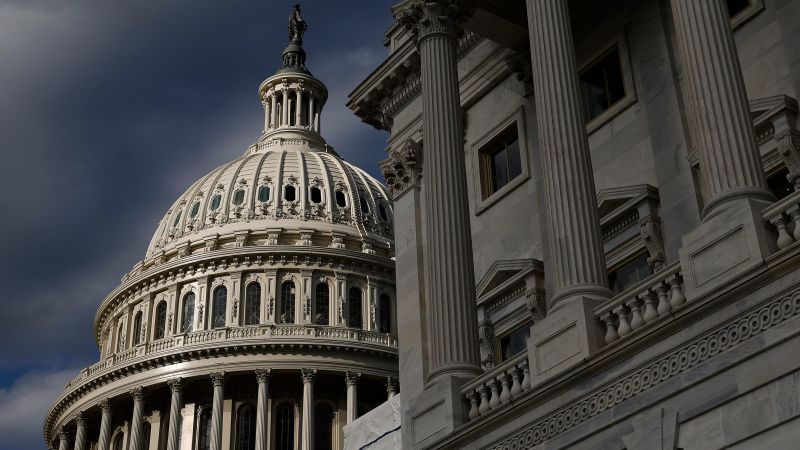This post may refer to COVID-19
To access official information about the coronavirus, access CDC - Centers for Disease Control and Prevention.

www.cnn.com
Biden and McCarthy lean on holdouts in both parties to pass debt ceiling deal | CNN Politics
Party leaders in Washington are waging an urgent campaign Monday to convince Democrats and Republicans to get behind compromise legislation that would avert a first-ever national default, with each side proclaiming victory following marathon talks.
Politics
—
Party leaders in Washington are waging an urgent campaign Monday to convince Democrats and Republicans to get behind compromise legislation that would avert a first-ever national default, with each side proclaiming victory following marathon talks.
Prospects for passage of the bill, based on the agreement struck between President Joe Biden and Republican House Speaker Kevin McCarthy, grew Sunday as many centrist Democrats fell in line and Republicans maintained confidence that they would be able to carry the support of the majority of their House conference in a pivotal vote expected Wednesday.
In both parties’ sights are those in the political middle, who leaders are wagering will swallow some provisions they disagree with in order to suspend the federal borrowing limit through January 1, 2025 – after the next presidential election – and avoid default. The bill caps non-defense spending, temporarily expands work requirements for some food stamp recipients and claws back some Covid-19 relief funds.
The release of the bill text Sunday evening amounted to a consequential moment for both Biden and McCarthy, whose political futures could hinge on their ability to pass the legislation while also selling it as a victory for their respective parties.
Speaking from the White House on Sunday, Biden hailed the agreement as critical to preventing economic disaster.
“It’s a really important step forward,” he said from the Roosevelt Room. “It takes the threat of catastrophic default off the table, protects our hard-earned economic recovery, and the agreement also represents a compromise – which means no one got everything they want, but that’s the responsibility of governing.”
The president shrugged off concerns from some Democrats who worry he gave away too much in his negotiations with Republicans.
“They’ll find I didn’t,” he said.
In a private call Sunday with House Democrats, Biden’s briefers defended their dealmaking with McCarthy, going into detail about what they had prevented from being added to the bill, according to multiple sources. They argued they stopped Republicans from pushing even stiffer work requirements and beat back efforts to repeal the Inflation Reduction Act and gut and gut Biden’s signature 2021 infrastructure law.
After those briefings, many Democrats signaled that they were willing to support the plan simply because there’s no other viable option to avoid default, lawmakers told CNN.
“It’s not a victory, but it’s a lot better (than) what might have happened if there were default,” one Senate Democrat told CNN after an evening briefing.
Members of two major centrist groups – the New Democrat Coalition and Problem Solvers Caucus – are expected to largely support the plan, according to multiple sources. That represents roughly 100 Democrats, which could be enough to offset the losses from members of the hard-right who are furious over McCarthy’s dealmaking.
Several members of the hard-line House Freedom Caucus have already harshly criticized the plan, vowing to try blocking it from passage.
McCarthy has insisted to House Republicans that Democrats “got nothing” in the negotiations, and he worked to amplify government spending caps and new work requirements for food stamps as critical wins long sought by the GOP.
But like Biden, McCarthy acknowledged the agreement required concessions from both sides.
“It doesn’t get everything everybody wanted,” McCarthy told reporters in the Capitol on Sunday. “But, in divided government, that’s where we end up. I think it’s a very positive bill.”
For McCarthy, the first big test will come Tuesday in the House Rules Committee, a panel that must adopt a rule to allow the bill to be approved by a majority of the House. To win the speakership, McCarthy agreed to name three conservative hardliners – Reps. Ralph Norman of South Carolina, Chip Roy of Texas and Thomas Massie of Kentucky – to the committee, a major concession since usually the powerful panel is stacked with close allies of the leadership.
Norman and Roy have emerged as sharp critics of the debt limit deal so far, while Massie was quiet while waiting for bill text to be released. If all three voted against the rule in committee, that would kill the bill – unless any Democrats vote to advance the rule.
McCarthy’s allies sought to play down the conservative revolt.
“When you’re saying that conservatives have concerns, it is really the most colorful conservatives,” Rep. Dusty Johnson said on “State of the Union.”
Passing the bill through the House will not be the final step. The package must also clear the Senate, where any single senator could stall progress for several days. On Sunday, a handful of powerful Senate Republicans had raised concerns about the deal’s defense spending during a Senate GOP conference call, a source on the call said.
But with the support of Senate GOP Leader Mitch McConnell and expected backing of Senate Majority Leader Chuck Schumer, several Senate sources say there is a high likelihood there’ll be 60 votes to break a filibuster attempt. The timing of the final votes in the Senate could slip into Friday or the weekend.
























































